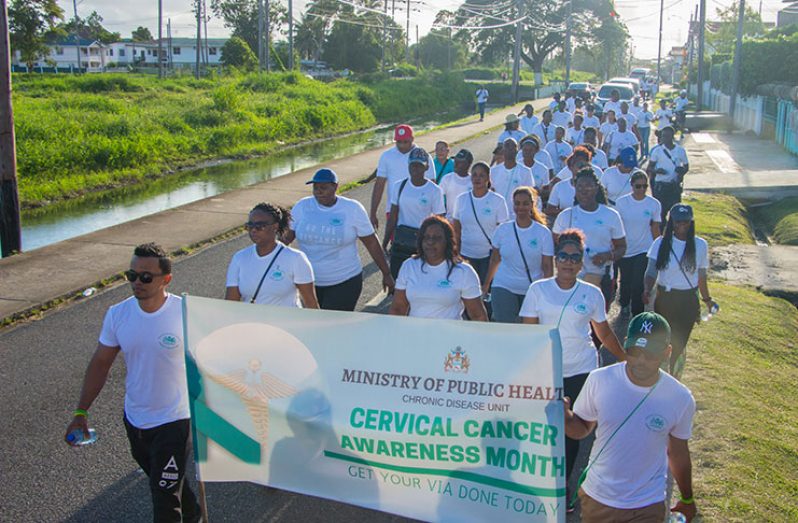— women urged to get screened
AS recommended by the World Health Organisation (WHO), the Ministry of Public Health (MoPH) will be targeting girls aged 9-16 years during a nationwide human papillomavirus (HPV) vaccination programme.
The ministry’s intent was highlighted by Minister within the Ministry of Public Health Dr. Karen Cummings at Parade Ground on Sunday, when Guyana joined the rest of the world to observe World Cancer Day 2018.
Dr. Cummings said the aim of the ministry is to achieve a minimum of 95 per cent coverage of the target population.
“We must encourage mothers to follow through, so that we can achieve full coverage, thus potentially reducing cervical cancer in the at-risk age group,” she said.
According to the WHO, HPV causes cervical cancer which is the second most common cancer in women worldwide.
In 2014, MoPH assessed cancers that occurred in Guyana over a 10-year period.
The data obtained demonstrated results similar to the statistics presented by the WHO; that is, in Guyana, cervical cancer was the second most common cause of cancer among women.
According to data obtained, the average incidence rate of cervical cancer in Guyana was 46.9 per 100,000. The highest incidence and prevalence rates were found among Afro-Guyanese women.
“Unfortunately, the data demonstrated that approximately two-thirds of all of the cases of cervical cancer occurred among women below age 60 years, and the highest percentage occurred in the 15-39 age group,” said the minister.
The data demonstrated that four per cent of the cervical cancers that occurred among Guyanese women over the 10-year period was diagnosed at stage one, whereas the majority of patients were diagnosed at stage four, which contributed to an average annual mortality of 27 per 100,000.
In an effort to reduce that mortality rate, Minister Cummings said Guyana was one of the first countries in the Caribbean to pilot the HPV Vaccination Programme in the coastland region.
The vaccination was administered to girls aged 11-13. She said an evaluation of the pilot demonstrated high uptake for the first dose of the HPV vaccine and very low uptake for the second and third doses of the vaccine.
COMPREHENSIVE PLAN
“The administration of the HPV vaccine to girls is part of a comprehensive plan developed by the Ministry of Public Health to reduce the mortality [rate] due to cervical cancer,” the minister said.
She added that her ministry is committed to the preventative initiative against the development of cervical cancer, as was demonstrated by the provision of funds required for the purchase of the vaccines and the other preparations needed for a successful HPV vaccination campaign.
Dr. Cummings pointed out that it is also imperative to note that during the campaign, the HPV vaccine does not replace screening for cervical cancer.
She said adolescents should also be educated on safe sexual practices and other risk factors for cervical cancer.
WHO had reported that HPV remains the most commonly sexually transmitted infection in both males and females in the world.
The global health body said it is essential for work to continue in the area of awareness and knowledge about HPV and the HPV vaccine.
Dr. Cummings said the ministry has recognized that there are inadequate local awareness programmes about HPV and the HPV vaccine, and as such, education interventions have been designed to improve knowledge levels.
She believes that such interventions may also influence individuals’ beliefs and attitudes about HPV vaccination, such as the acceptability of school-based HPV vaccination programmes.
“It is really important for women to understand the importance of attending cervical screening when they receive a letter from their physicians, as it can detect pre-cancer abnormalities, which, if left untreated, may develop into life-threatening cancer. Screening is for people without symptoms as a preventative measure,” she emphasised.
The minister stressed that it is important to heighten awareness about cervical cancer caused by the HPV, so that women can get their pap smear tests done to detect pre-cancerous changes and early-stage cervical cancers.
Prior to what was said by the minister, representatives of the ministry and other advocates marched the streets of Georgetown to raise awareness about HPV and cervical cancer.
“It is not just a walk, we walk in honour of those who are fighting cervical cancer and [in] remembrance of those who lost the fight to the disease,” said one of the participants, adding that raising awareness is indeed important.



.jpg)








